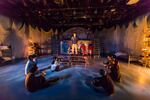
A scene from the polar epic, "Magellanica", premiered at Artists Repertory Theatre in 2018, featuring John San Nicolas, Michael Mendelson, Eric Pargac, Sara Hennessy, Joshua J. Weinstein, Barbie Wu, and Vin Shambry.
Russell J. Young / Courtesy of Artists Repertory Theatre
Artists Repertory Theatre has opened performances of a leviathan show that has even caught the attention of the New Yorker magazine.
"Magellanica" is an immersive, five-and-a-half hour story of eight scientists, engineers and soldiers spending a polar winter in Antarctica. The play is partly about the friction that comes when a small group of idiosyncratic people spend eight cold, dangerous months unable to leave each other’s company. As one character, the bristly climatologist Dr. Morgan Halsted, puts it, “No one goes to Antarctica accidentally. You don’t take a wrong turn or get on the wrong train and find yourself here … We all have our reasons for being here.”
The story, set in the 1980s, also seethes with the political and social tensions gripping the world outside. Halsted, played by Sarah Hennessy, spends much of the trip sparring with a Soviet colleague, Dr. Vladimir Chapayev, played by Michael Mendelson.
“I wonder when Cold War will come to here,” Chapayev taunts Halsted, gesturing to their cramped shared lab. “I have been waiting for it and watching for it. And now, here you are, trying to take my territory.”
But their fights are a thin veil for their fears, as they realize they are on the edge of proving to the world a hole has formed in the ozone of the Antarctic sky above them.
“Magellanica” runs through Feb. 18. It was written by E.M. Lewis, an Oregon playwright who lives on family farmland in Marion County. On "Think Out Loud" last week, she told us she did not foresee the resonance a period story would have with Magellanica’s audience in 2018.
Q&A with E.M. Lewis
April Baer: Why did you set the play in the 1980s?

Playwright E.M. Lewis used an elaborate mosaic of notes to keep track of the five-act plot of "Magellanica".
April Baer / OPB
E.M. Lewis: Part of the reason I decided to set it in the mid-'80s was that was when this particular scientific discovery was made. But it was also how deeply that moment in time is relevant to what's happening right now, in our world, in our politics. More than when I started writing the play, this is relevant to the moment. We just pulled out of the Paris Accord. And the Doomsday Clock was just moved to two minutes until midnight, which it hasn't been since the middle of the Cold War.
Baer: Is there a kind of person who goes to Antarctica?
Lewis: Smart people. There's tons of science being done there from all different countries, but also people run to Antarctica when they are trying to go to a place that is away from whatever they're fleeing in their own selves. There's a wonderful Werner Herzog documentary called "Encounters at the End of the World" that documents some of these people. [It was] fascinating research. I have three shelves of books on the South Pole.
Baer: Let’s talk about the characters you created. There are the two climatologists, Dr Chapayev and Morgan Halstead. There are a couple of soldiers in the party including a Vietnam vet suffering pretty serious PTSD, a young scientist — Dr. May Zhou, and a Bulgarian mapmaker who’s trying to complete a perfect map of the world. Had you written an ensemble piece of this size before?
Lewis: Not of this size, length-wise. I'd written larger pieces in numbers of characters. My play, "Infinite Black Suitcase" has 15. You have time to delve with these characters, like you would in a novel or a miniseries. You can see what happens to people over time. So far, in previews, the audiences have been so fantastic, leaping to their feet before the lights even come up.
Baer: Was there ever a moment, writing this five-hour play, when people said to you, "Don’t do it. No one will come"?
Lewis: Absolutely. When I finished Part One, the first thing someone told me is, "Well, you're going to need to cut most of that." I was like, "No, no, I think this is going to be longer."
